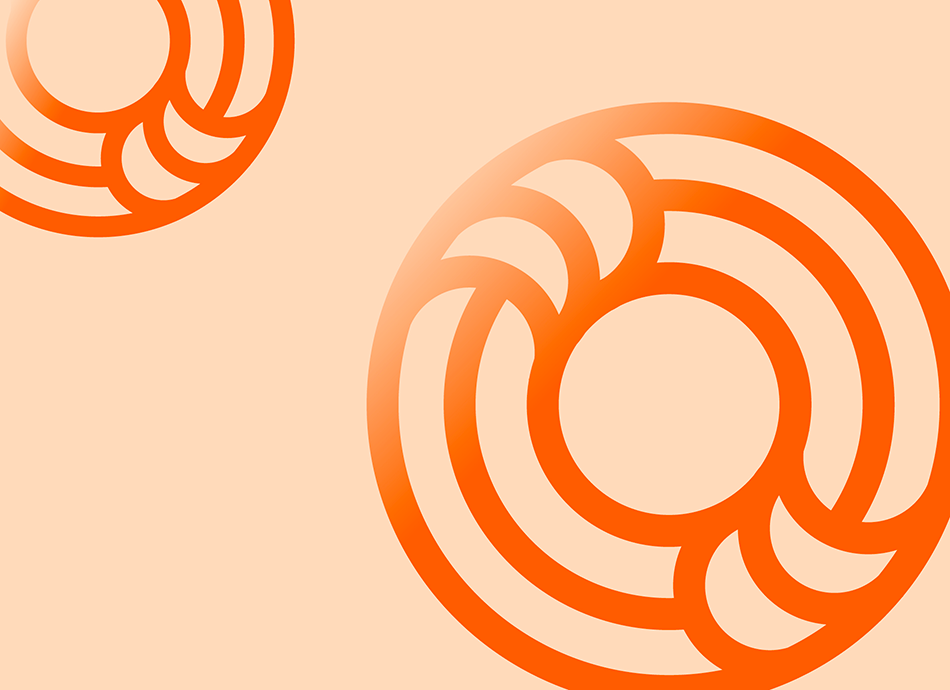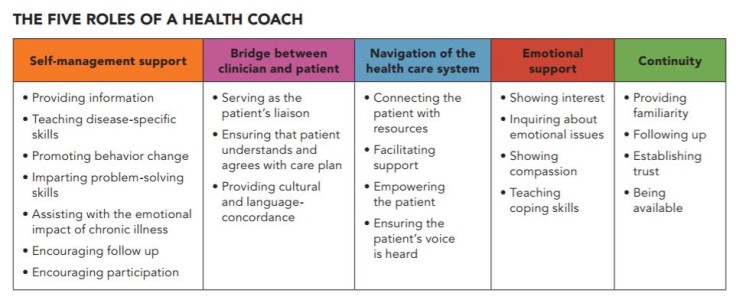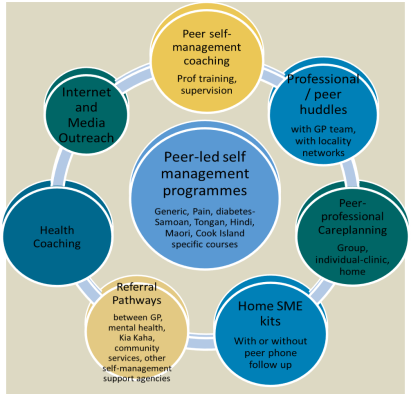Wishing everyone a safe and happy Christmas and New Year – Meri Kirihimete from the Healthify team.
Health coaching for healthcare providers
Key points about health coaching
- Health coaching is a way of helping people gain the knowledge, skills, tools and confidence they need to take an active part in their own health care. It helps them reach the health goals they want to achieve
- Health coaching is useful if you are working with someone who has ongoing health issues or complex health needs. It can include whānau members, so they can also support your client in achieving their health goals.
- This page contains information on how to become a health coach and case studies.

Health coaching is based on the saying that if you give a person a fish, they will eat for a day, but if you teach them to fish, they will eat for a lifetime.
It’s not about one person rescuing another; it’s about giving someone the resources to help themselves. Rescuing is appropriate for acute care when doctors need to take over and do something or tell someone what to do. But if someone has an ongoing health issue, rather than telling them what to do, a health coach works alongside them so they can manage their condition well and achieve the goals that they set.
Video: Health Coaching (Setting the Agenda): Techniques to Deliver Patient Centered Care
(Nathaniel Montgomery, 2013)
Just like sports coaches, the role of a health coach is to inspire confidence in you, share knowledge with you and find ways to motivate you to achieve your goals.
They might help someone manage their appointments or medication, answer questions about their condition, or explain more fully why the doctor recommended they take certain actions. They will help them work out what they want to achieve and will help them find the support to do that.
Health coaches have five roles, which are to:
- provide support for their client to manage their condition themselves
- bridge the gap between their client and their doctor
- help their client find their way around the healthcare system
- offer their client emotional support
- be their client's ongoing first person to contact if they have a question.

(Image source: American Academy of Family Physicians, Fam Pract Mgt, 2010)
Video: Health Coaching (Action Plans): Techniques to Deliver Patient Centered Care
(Nathaniel Montgomery, 2013)
Medication review
In different countries, different terms are used for medication reviews or reconciliations. In New Zealand, a medication reconciliation is usually a formal process by a health professional such as a pharmacist with special training to do this.
A simple medication review can be conducted by a health coach to help understand how a person is actually taking their medicines. This information can then be passed onto the prescriber or a pharmacist to provide more specific advice to the patient.
Video: Health Coaching (Medication Reconciliation): Techniques to Deliver Patient Centered Care
(Nathaniel Montgomery, 2013)
Skills
Anyone with the right aptitude, interest, person/whānau-centred approach, personality and compassion can potentially become a health coach. It is the mindset and approach that is more important for this role than how many qualifications you have.
As a result, health coaches can have very diverse backgrounds including:
- clinically trained health coaches, such as nurses, occupational therapists, pharmacists, physiotherapists, social workers and doctors
- lay-leaders or peer support health coaches, such as receptionists, healthcare assistants, community workers, Stanford course leaders and more.
Non-health professionals are ideal for the role of health coach, as they can provide a bridge between an over-stretched clinician and a patient needing the input of time and information to help them best manage their health. When practices maximise the use of lay people as peer health coaches, it frees clinicians to focus on aspects of patient care that require their expertise.
Health coaches use evidence-based practice and improvement science methodology to support patients, unlike wellness coaching, which may not draw on best practice.
Health coaching is based on a collaborative approach rather than a directive one, so as well as requiring some technical skills that can be taught, a health coach needs certain personality traits.
It therefore suits people who:
- can match the cultural and language needs of the population being served
- has excellent communication skills, including listening skills
- has an encouraging, supportive and motivating attitude and approach
- can connect with a wide range of people
- is empathetic, caring and nurturing.
Candidates for health coach training could include those who have these personal qualities and who currently work as a:
- receptionist
- healthcare assistant
- whānau ora worker
- community health worker
- peer support worker
- care coordinator
- Stanford course leader.
Training options for health coaches
There are several training options to become a health coach. Find out more on the SMSToolkit website(external link). For support implementing health coaching and delivering training, you can also contact us(external link).
Overseas experience of health coaching
Two models of health coaching have been trialled overseas.
The teamlet model
In this model, the 15-minute primary care visit is extended to include coaching before and after the appointment to the doctor. Prior to seeing the health professional, the coach checks on medicine and helps with agenda setting for the consultation and then assists during the consultation. Immediately afterwards, the health coach assesses whether the patient understands and agrees with the recommended care plan, while also motivating the patient to engage in behaviour change. This is supported by phone calls between visits.
The hospital-to-home model
One widely used programme in the United States reports a 20–50% reduction in hospital re-admissions. Their programme focuses on these 4 pillars:
- Having a reliable plan in place to take medicaines regularly.
- Overcoming barriers to follow-up appointments.
- Having an acute plan and ensuring patients know how to recognise and respond to worsening signs and symptoms.
- Using a personal health record to record 30-day goals, health information and key questions to be shared with the doctor or nurse at the next appointment.
Several studies have shown health coaching to be effective.
Researchers have found promising clinical benefits from health coaching in diabetes and asthma management, while phone coaching improved attendance at colonoscopy clinics and better adherence to lipid-lowering drugs than usual care.
Clinics in the US have also reported productivity gains in delegating the work of health coaching away from primary care clinicians, with reports of physicians being able to see 2 to 3 more patients a day, and improvements in visit volumes and collections by 60%.
One study on type 2 diabetes found that after 6 months, people who were coached showed improvement in medicine adherence, as well as a positive effect on their knowledge, skill, self-efficacy and behaviour change, while a non-coached control group did not show any improvement. Also, coached participants with a hemoglobin A1C over 7% showed significant improvement in A1C.
A study on coronary heart disease found that patients in a coaching programme achieved a significantly greater change in total cholesterol of 14 mg/dl than the non-coached patients, with a considerable reduction in LDL-C. They also showed improvements in secondary outcomes such as weight loss, increased exercise, improved quality of life and less anxiety, as well as improvement in overall health and mood.
Another study found telephone coaching to be effective for assisting people with weight loss. The average body mass index of participants significantly decreased during the study, from an average baseline of 32.1% to 31.4% at 3 months, 31% at 6 months and 30.6% at 12 months.
In a study on tobacco cessation over 12 months, the coached participants had a 32% quit rate compared to 18% for nonparticipants.
And a study in 6 Minnesota primary care clinics found that adult patients with hypertension, diabetes or heart failure who were allocated ‘care guides’ (health coaches) achieved more goals, had a greater reduction in their unmet needs and improved more than the usual care patients in meeting several individual goals, including not using tobacco.
SMILE: Self-Management is Life Enhancing Project
The vision for SMILE is to normalise self-management support in ProCare-affiliated practices in the Manukau locality. As part of this project, in 2016, ProCare worked in collaboration with the Mt Wellington Family Health Centre to pilot the health coach model.
This pilot enabled the SMILE team to identify the skills and competencies for the health coaching role and develop a job description for use by other general practices. They also identified the issues that patients covered in their health conversation topics.
The most frequent topic was appointment booking, followed by goal setting, healthy lifestyle, nutrition and whakawhanaunga (nurturing the relationship). Other issues included blood glucose levels and medication.
Source: Manaaki Hauora Supporting Wellness Campaign report,(external link) Ko Awatea, Counties Manukau DHB
Health coaching workshops
As part of its Kia Kaha project, Manage Better Together, Ko Awatea runs training in health coaching. The project is part of its Manaaki Hauora – Supporting Wellness campaign, which aims to help people with long-term conditions manage their own health for a better life.
The original Kia Kaha was developed as a model of care in the primary care setting for people living with two or more long-term conditions who require significant levels of hospital-based care. It has now expanded the original team to include options for self-management education, health psychology, peer support and care co-ordination.
This has led to running two-day health coaching workshops, which have been attended by primary and secondary care health workers, including diabetes specialists, pharmacists, nutritionists, psychologists, peer workers and volunteers.
Organiser and health psychologist Leona Didsbury says, “We’re very encouraged about the value of health coaching skills as an enhancement of practice for anyone working with patients as it is very patient-centred. We are especially excited about the possibilities of health coaching ‘teamlets’ working together in primary care. Our feedback to date indicates people find this training relevant and useful for their setting.”
East Tamaki Healthcare (ETH) PHO health coaching programme
Building on the success of their peer-led self-management education (SME) programme, Kia Kaha, ETH has initiated a health coaching programme. It has also expanded the original team to include options for self-management education, health psychology, peer support and care coordination.
To support the development of health coaches within their team, they have also been running two-day health coaching workshops as part of the Manaaki Hauora project. These workshops have been attended by primary and secondary care health workers, including diabetes specialists, pharmacists, nutritionists, psychologists, peer workers and volunteers.
Organiser and health psychologist Leona Didsbury says, “We’re very encouraged about the value of health coaching skills as an enhancement of practice for anyone working with patients as it is very patient-centred. We are especially excited about the possibilities of health coaching ‘teamlets’ working together in primary care. Our feedback to date indicates people find this training relevant and useful for their setting.”
Leona is a trained facilitator of the University of California's Centre for Excellence in Primary Care health coaching programme. She has run several training sessions as this is proving to be a popular course for both regulated and non-regulated health staff, both from ETH and other organisations in the Counties Manukau district.
All health coaches working in ETH have regular supervision as well as a weekly mentoring and support session. The health coaches reflect the cultural and linguistic makeup of the enrolled population.
Challenges have included getting the resources to do the training and quality control, the need to maintain and support the lay and volunteer workforce, and referral of patients to the programme.
To overcome these challenges, support from Counties Manukau Health and Ko Awatea as part of the Manaaki Hauora campaign has made a big difference, as well as the seed funding that enabled it to happen. A validated and structured health coaching model has enabled role definition boundaries.
Key lessons that may be useful for other teams who are interested in starting health coaching include to:
- build on what works (lessons from the SME implementation informed the model)
- apply the improvement science methodology rather than depend on evidence from RCTs
- give time to explore ideas and to change and do things differently
- use a structured health coaching programme because it makes the idea easier to sell to others in the organisation, particularly clinical staff
- include information about the programme in in-house online publications
- offer a menu of options.
The model below shows how health coaching fits into the overall SME approach.

(Source: East Tamaki Healthcare (ETH) PHO – Health Coaching Programme)
Report from a health coach
Bob's story
“In February, Bob was very interested in looking at Big Boys Club. His wife had just had their first baby, and this had prompted Bob to look at weight loss and a healthy lifestyle.
I started working with Bob in February. It was a very different interaction from the norm. From then until now we have not actually met in person. The beauty of this programme is that we can think outside the box and communicate in the best way possible to accommodate the busy lives of patients.
The constant contact has been via phone and internet. For example, I sent Bob a link for the Big Boys Club introduction. His response was very positive – he couldn’t wait to get started, so we organised him to meet a colleague, Edith Tatana. The 21st of March was set for Bob to meet up at the gym with Edith. The meeting went well. Bob met with Buck Stowers and was ready to sign up for the Big Boys Club.
The health coach sent an email to the GP, as Bob needed a referral or endorsement to attend the Big Boys Club programme. This sparked the team looking at him being able to take part and looking at the criteria for the programme. After the collaboration of the GP and the coordinators, Bob started the programme. He is thoroughly enjoying it.
After three months, I called Bob to catch up. He is doing very well. He has lost 17kg and feels great. He will attend the GP for a check in a month and then we will see the difference in his baseline results.”
*Name changed to protect privacy.
Peer support case study
Theresa's story
Theresa's goal was simple. She wanted to take care of her health so that she could better look after her family. She not only achieved her goal, but she also lost 9kg over the 10-week programme.
Theresa knows that she succeeded because of the support and practical help she got from the other programme participants.
- Bennett HD, Coleman EA, Parry C, Bodenheimer T, Chen EH. Health coaching for patients with chronic illness(external link) Family Practice Management. 2010 Sept/Oct:24–29.
- Main J, Anstis O, O’Brien J. Mapping patient journeys to improve patient experience Ko Awatea(external link). 2017 February; 492.
- Bodenheimer T, Lorig K, Holman H, Grumbach K. Patient self-management of chronic disease in primary care(external link) JAMA, 2002;288(19):2469–2475.
- The Care Transitions Program(external link)
- Anderson P, Hally MD. A new approach to making your doctor-nurse team more productive(external link) Family Practice Management. July/Aug 2008:35–40.
- Wolever RQ, Dreusicke M, Fikkan J, Hawkins TV, Yeung S, Wakefield J, Duda L, Flowers P, Cook C, Skinner E. Integrative health coaching for patients with type 2 diabetes: A randomized clinical trial(external link) The Diabetes Educator. 2010 June 9;36(4):629–639.
- Vale MJ, JeLinek MV, Best JD. Coaching patients on achieving cardiovascular health (COACH): A multicenter randomized trial in patients with coronary heart disease(external link) Archives of Internal Medicine. 2003 Dec 8;163(22):2775–2783.
- Merrill RM, Aldana SG, Bowden DE. Employee weight management through health coaching. Eating and Weight Disorders: Studies on Anorexia, Bulimia and Obesity(external link) 2010 Mar-June;15(1-2):52–59.
- Terry PE, Seaverson, ELD, Staufacker, MJ, Tanaka A. (June 2011). "The effectiveness of a telephone-based tobacco cessation program offered as part of a worksite health promotion program"(external link) Population Health Management. 2001 June;14(3):117–125.
- Adair R, Wholey DR, Christianson J, White KM, Britt H, Lee S. Improving chronic disease care by adding laypersons to the primary care team: A parallel randomized trial(external link) Ann Intern Med. 2013 Aug 6;159(3):176–84.
- Lansakara N. Health coaching inspires(external link). Ko Awatea: Health System Innovation and Improvement. 2017 Jan.
- Ko Awatea and Counties Manukau Health. SMILE: Self-Management is Life Enhancing(external link). Manaaki Hauora – Supporting Wellness Campaign. 2016 Aug;20–21.
- East Tamaki Healthcare (ETH) PHO – Health Coaching Programme.
- Case study reported in Ko Awatea and Counties Manukau Health. SMILE: Self-Management is Life Enhancing(external link). Manaaki Hauora – Supporting Wellness Campaign. 2016 Aug; 20–21.
Credits: Healthify editorial team. Healthify is brought to you by Health Navigator Charitable Trust.
Reviewed by: Dr. Janine Bycroft
Last reviewed:
Page last updated:


